#tpodg spoilers
Text
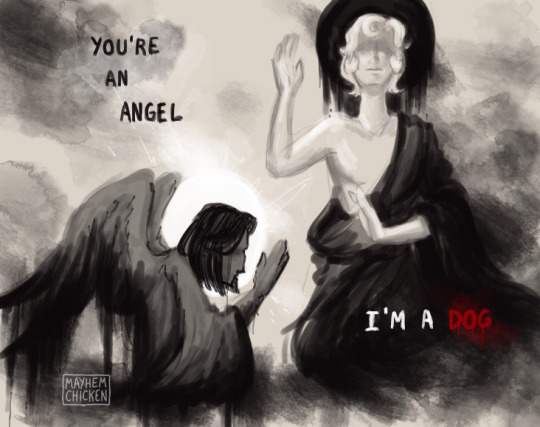
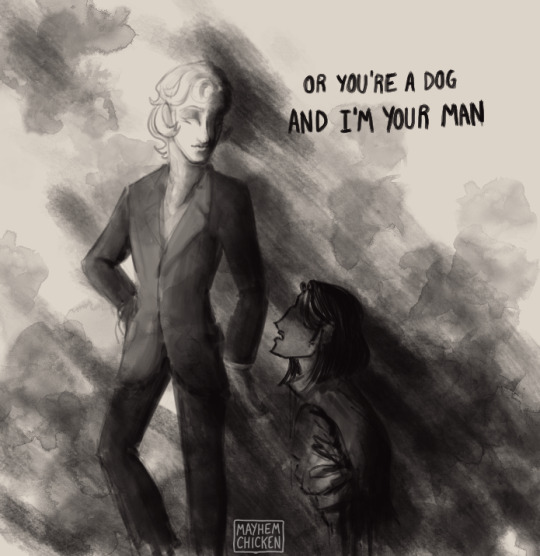
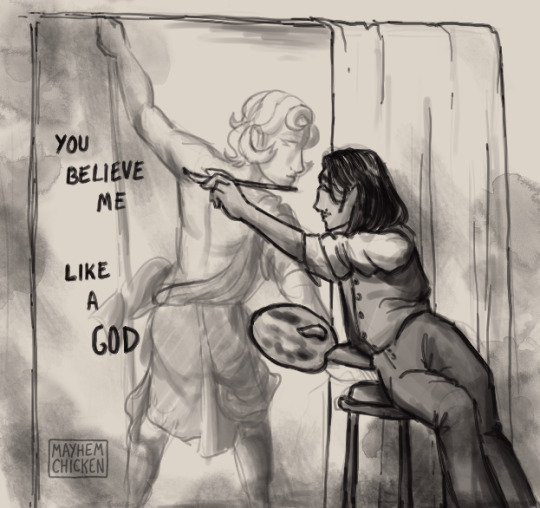
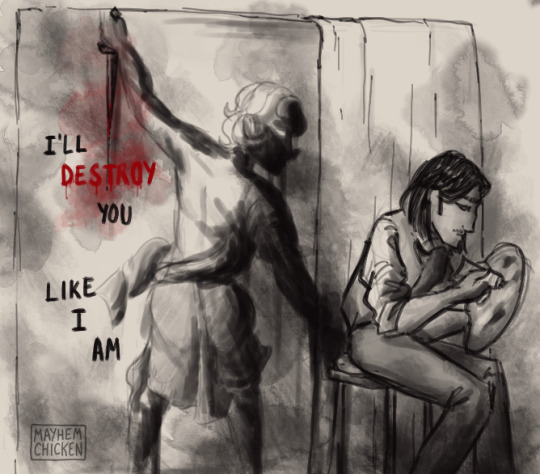

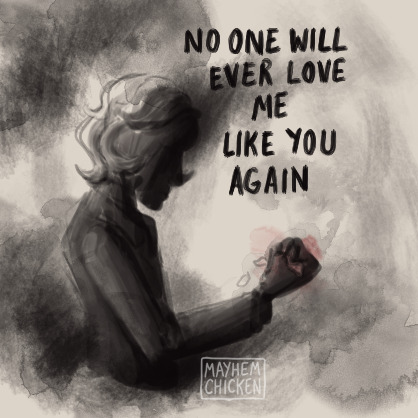
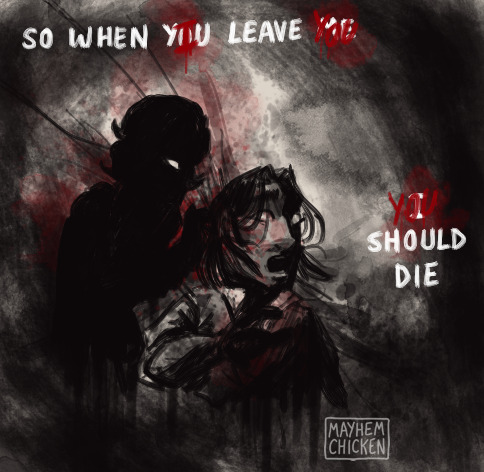
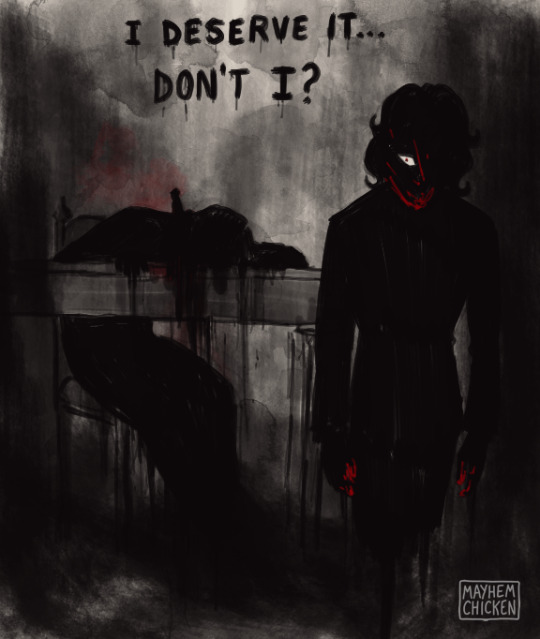
you believe me like a god // i'll betray you like a man
credits:
Song lyrics taken from I'm Your Man by Mitski
Artworks referenced:
The Annunciation - Workshop of Fra Filippo Lippi
Last Judgment in an Initial C - Lorenzo Monaco (Piero di Giovanni)
Boy with a Greyhound - Paolo Veronese (Paolo Caliari)
Venus and Adonis - Peter Paul Rubens
#art#artists on tumblr#the picture of dorian gray#tpodg#tpodg spoilers#basil hallward#dorian gray#cw blood#cw violence
466 notes
·
View notes
Text
Underrated Dorian Gray moment:
dorian: Alan this guy totally committed suicide 😰😰
alan: ok??? i’m still not helping your bitch ass??? 🤨😒
dorian: Alan I murdered him 😱😱😱😱😱😱
#He switches so fast#AND IT STILL DOESNT CONVINCE ALAN#It’s hilarious#the picture of dorian gray#tpodg#the picture of dorian gray spoilers#tpodg spoilers#dorian gray#alan campbell
95 notes
·
View notes
Text

"Fin de siècle," murmured Lord Henry.
"Fin du globe," answered his hostess.
"I wish it were fin du globe," said Dorian with a sigh. "Life is a great disappointment."
i keep thinking about this bit..... he's so dramatic (fin de siècle meaning "end of the century," & fin du globe meaning "end of the world.")
#lonely dog speaks#he is understandably feeling dramatic because he just had to get someone to dispose of a body#but out of context i think it's humorously melodramatic#tpodg spoilers#the picture of dorian gray
5 notes
·
View notes
Text
Dorian Gray and Basil Hallward
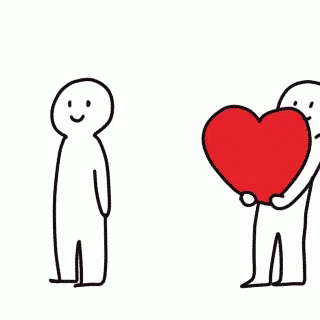
Recently been reading The Picture of Dorian Gray by Oscar Wilde and I had to make this.
SPOILERS - Basil did not only get rejected by the love of his life after confessing his love, he got FRIENDZONED.
'... You and I are friends, Basil, and we must always remain so.' - Dorian Gray

#basil really did love dorian#all the way till the end#and boy#the level of GAY in this book#is WOW#extra spoiler#things are about to get much worse for both dorian and basil#for anyone who doesn't know#the picture of dorian gray#is about a beautiful young man called dorian gray who trades his soul for eternal youth#he remains young and beautiful forever#but a portrait of him (painted by basil hallward) gets uglier and older every time he commits a sin#his sinful behaviour is influenced by a horror called lord henry wotton#the relationship between these three is VERY homoerotic btw#if you haven't read it you ought to#have a good day/night!#tpodg
25 notes
·
View notes
Note
If you think about it, both Dorian and Dracula were ruining/taking lives while maintaining/regaining youth. Though there's no portrait in Dracula's case, unless you count his oldness going to youthful Jonathan.
You're right, the more you look for parallels the more considerable they become.
Going to pop the rest of this under a cut for Dracula spoilers and discussion of suicide.
While Jonathan doesn't explicitly age like the portrait does, he undoubtedly looks older once Dracula has finished preying on him than he did at the start, as well as the other ways in which he and Dracula swap places (e.g. Dracula going out wearing Jonathan's clothes).
Association with both of them is damning too. In Dracula's case literally, as the people he feeds on become vampires in turn. In Dorian's case because he drags his victims down with him. Sometimes that is also literal: it includes two deaths by suicide, namely Alan Campbell and "that wretched boy in the Guards", and suicide is traditionally a mortal sin.
There are parallels in their victims. Dorian makes use of social convention to avoid the consequences of his actions, particularly as an upper-class man who preys on lower-class women (among others); an affair with him is socially ruinous for women but he comes out nearly unscathed. Dracula doesn't choose his victims quite as deliberately, but his choice of Lucy has the same effect. For instance, when Dracula lures Lucy out of the house in Whitby, Mina's first priority is to keep that a secret for the sake of her reputation.
They are both at their most powerful in their own spheres: Dracula in Transylvania, Dorian among London high society. They struggle when they step outside those spheres: the people in the opium den come much closer to recognising Dorian for what he is that anyone from the upper classes; Dracula is foiled by travelling to England. We don't see Dorian leave the country (we know he goes on holiday, but that doesn't really count) but I feel like if he went fully out of his sphere, he might be more readily identified. (A factor here is that Bram Stoker is more willing to demonise a foreigner than Oscar Wilde is willing to demonise the British upper classes).
And writing this has made me realise that pop culture Dracula - suave, sexy, encouraging people to lose their inhibitions - actually resembles Dorian quite a bit more than actual Dracula.
There's also at least one difference where you might expect a similarity. A key theme in Dracula is the relationship between the generations: Dracula is old age eating youth, Van Helsing is old age guiding and advising youth.
Meanwhile, something that strikes me about Dorian Gray that it's oddly timeless; we get told that twenty years have passed, but there's never much of a sense of that beyond everyone else looking older and Dorian remaining unchanged. No one has children, no one dies of old age, society and technology seem much the same from the start of the 20-year span of the novel to the end, despite the significant changes of the late 19th century.
And that timelessness, I think, is part of how little the novel is interested in the relationships between generations. There's not much sense that Dorian is now a middle-aged man (by Victorian standards, don't get annoyed with me, I'm in my 30s too) acting out a young man's role. There could be, it would be consistent with the plot, but that's not something that Wilde explores. There is a very strong message that Dorian should be a better person but not that he's behaving in an age-inappropriate way.
(I wonder if this relates to the novel's autobiographical elements. It can be fun and sexy to think of yourself as debauched and evil and corrupting but not so much as someone who's just been acting like a teenager for a decade too long).
This plays into other things as well. Dracula is a deliberately modern novel: it has telegrams, typewriters and trains. It's the battle of the modern against the medieval. Dorian Gray doesn't have any of these things. The conversation in chapter 3 about Americans is very much of its time, but there's not much else that places the action anywhere in the 19th century in particular. Dorian Gray is captured by a portrait, not a photograph. And he lives an oddly old-fashioned life, in some ways, for someone who is supposed to represent the Spirit of the Age. That's not a criticism of the novel, but it feels notable. It makes me wonder how Dorian Gray might have differed if Dracula had been written first and Wilde had read it.
Anyway, that was probably more rambling than you wanted, anon, but thank you for the ask, it was fun to consider :)
53 notes
·
View notes
Text
Fellas, is it gay to go to prison for ten years to cover for your 'friendship coloured by romance' ????
#dark academia#dark academia aesthetic#literature#classics#poetry#if we were villains#iwwv#iwwv quotes#iwwv spoilers#tsh#the secret history aesthetic#oscar wilde#the picture of dorian gray#tpodg
145 notes
·
View notes
Text
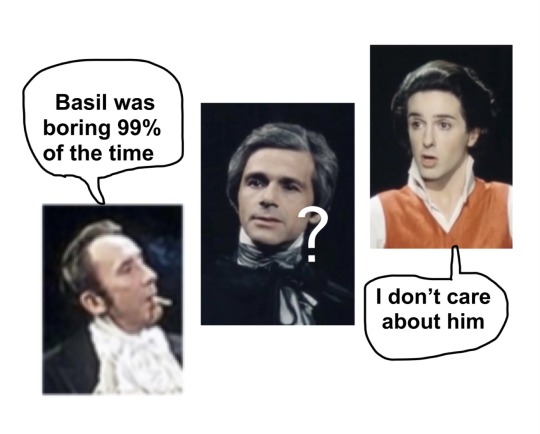
So while the 1976/1977 French stage/film adaptation of Dorian Gray is very faithful to the original book in the general tone, there are a few deviations (some I feel a slight shame some I enjoy immensely and overall the results are magnificent)
(SPOILERS BELOW)
In chapter 19 of the 1891 version of tpodg, Dorian has a conversation with Henry. The following dialogue is an excerpt of it.

This is a part that didn’t exist in the 1890 novella version, but was kept in the French production.
-Que diriez-vous, Harry, si je vous assurais que j’ai assassiné Basil?
-Je penserais, mon cher, que vous prenez une pose qui ne vous va pas. Tout crime est vulgaire, de même que toute vulgarité est criminelle. Ce n’est pas vous qui commettriez un tel crime, Dorian. Le crime est l’apanage des plus basses classes. Je ne les en blâme pas d’ailleurs. J’imagine que le crime est pour elles ce que l’art est pour nous: une manière de se donner des sensations rares.
In the original book, it is then followed by:
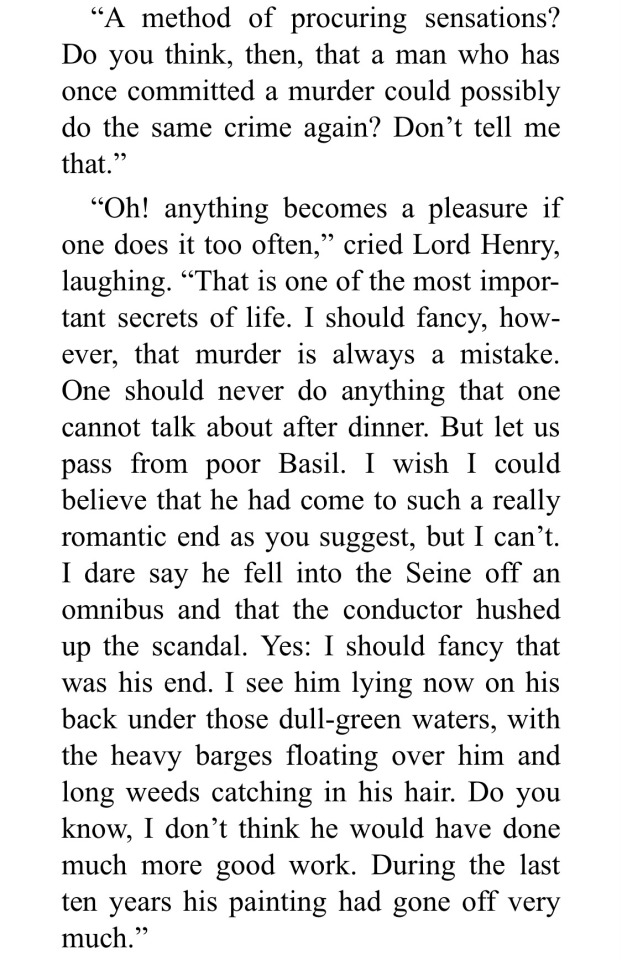
In the play however, it is continued by these lines:
-Le crime se promène dans toute les couches sociales, mon cher. Quant aux sensations rares qu’il procure, permettez-moi d’en douter. Je vous répète qu’il se peut fort bien que je sois l’assassin de Basil.
-Vous n’arriverez pas à me convaincre, Dorian. Et pourquoi l’auriez-vous tue? Je vous le demande.
-Eh bien, je ne sais pas, par jalousie pour ses dons artistiques, par exemple.
(which roughly translates as:
"Crime runs through all social classes, my dear. As for the rare sensations it creates, allow me to doubt it. I repeat to you that I may very well be Basil's murderer."
"You won't be able to convince me, Dorian. And why would you have killed him? I ask you."
"Well, I don't know, out of jealousy for his artistic gifts, for example." )
Dorian being jealous of Basil is an extremely interesting idea, and is immediately pointed out by Henry in the play:
-Dorian! Il y a 20 ans, à la rigueur j’aurais pu vous croire. Mais aujourd-hui! Sa peinture avait bien faibli, convenes-en, elle était en pleine décadence. Quelque chose semblait l’avoir quitté, vous ne trouvez pas? Elle avait perdu son idéal…Quel a été la raison de votre rupture? Basil vous ennuyait sans doute? …
(Dorian! Twenty years ago I could have believed you; but today! His painting has gone off, we must admit, it was in full decline. Something seemed to have left him, don't you think so? It had lost its ideal... What was the reason of your falling apart? Supposedly Basil bored you?)
The latter parts of the dialogue allows us to return back to the book, but the question remains, what is Dorian jealous of? Let us return to the book, as it hints through Henry's lines:
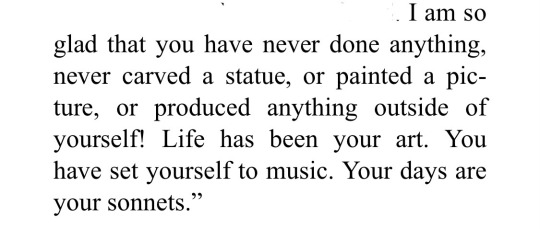
Life was Dorian's art, and his results were ugly, as reflected in his portrait hidden behind the attic drapes. He would enjoy all the beauty he radiated in the eyes of a worshipper and forever be jealous that he failed to create something of similar nature. As Henry says, Dorian on a pedestal had never crafted anything. While he tried to give himself an independent life, he was always under either the influence of Henry or the shadow of Basil. If Henry represented all the sins Dorian never had the courage to commit, Basil was all the virtues that Dorian never had the courage to dedicate himself to. Dorian wants and wants: he wants to hold everything, and so jealously engulfs him when he is reminded of the lost virtues through his confrontation with Basil, when Basil falls upon his knees and begs for him to seek redemption, when Basil gives, without hesitation, forgiveness. All his differences with Basil and all his want for his innocence drives his blade.
There is a want in Dorian to be recognized beyond a pretty visage, a youthful miracle. But he has killed that potential himself, to the point that he has no evidence to prove his crime, no ears to listen to his confession, and no voice to speak a word. His death marks the final blow of a tragedy: that he will always remain a pretty visage, a youthful miracle, with a frame and canvas as his coffin.
#the picture of dorian gray#im very normal it is obvious#this is like. a small part of my tpodg thoughts#i'll probably check the writing tomorrow atm i'm too tired
15 notes
·
View notes
Note
That person is using the old-ass academic take that Dracula himself represents homosexuality (as something predatory) and Jonathan is the self-insert who is disgusted by Dracula and therefore homosexuality (so he represents homophobia).
By that logic, TPODG is a homophobic cautionary tale against homosexuality because Dorian is gay and therefore represents homosexuality while being the shittiest man alive who dooms people.
And Basil, who is also gay, is PUNISHED with death for his same-sex love.
Like, we can make wild logical jumps too, bucko.
Me: *responding out loud* "Yeah, Dorian is Gray--"
Me: *perishes*
Spoilers spoilers!
Yeah, Dorian is gay, and he is just the worst little twink to walk this planet Earth. He murders Basil for confessing his homosexual feelings to him. HE DESTIEL-CONFESSIONS BASIL. If that isn't some internalized homophobia. Hell, I think murder is pretty external.
Now, am I saying you can't like Dorian? Nah, you can have gay characters be awful, it's only fair. Be gay do crime. But like you can't deny there's some homophobia in the depiction of Dorian. Basil is painted in a slightly better light, and I think that could be because he's sexless. He's a repenting gay while Dorian is an evil sinful gay. Dorian is the very picture (haha zing) of what lawmakers in the Victorian era thought of gay people, just an unstoppable force of debauchery.
And holy shit, if they really think Dracula is 100% homosexual, why does he assault so many damn women? Why is his main deal enslaving women for his nefarious purposes? He took one bite out of one twink and people think he's a gay icon. He's really just a rich cunt who used his wealth and power to get whatever he wanted for hundreds of years until a ragtag group of young queer adults and their grandpa kicked his ass with paperwork and soliciting. And sharp knives.
And like? Dorian killing Basil? Basil idolized Dorian and that might have contributed a bit to Dorian's narcissism, but what really led to Dorian's downfall was him literally selling his soul in a Faustian bargain and then indulging every dirty impulse he ever had. Unlike with Basil Confession, Jonathan killing Dracula is not punishing the Count for being gay, he's reclaiming his life after it was nearly completely destroyed by an abusive older man. Jonathan is a white-haired genderqueer twink who tag-teamed with a hot cowboy to murder his ex sugar daddy, he does not deserve this disrespect.
8 notes
·
View notes
Text
Guys, I started rereading TPODG because of a post that said that Dorian got called ‘good boy’ at least 9 times [Idk the link, but here’s a pic of it:
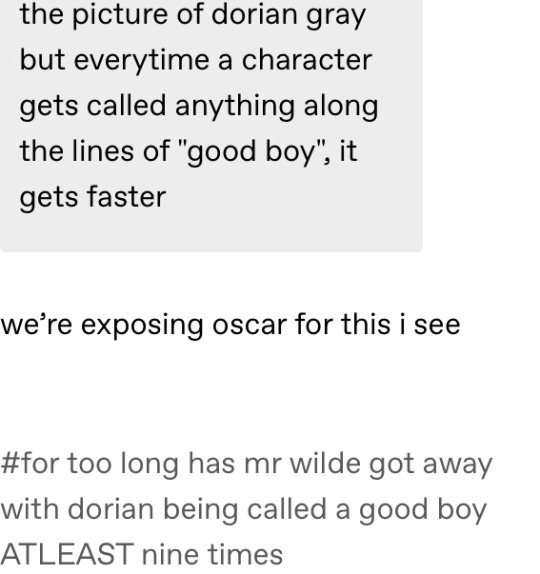
], and I wanted to check whether this was true. However, I started annotating and underlining too many things on the ebook, so today I decided to just search ‘good boy’ in it, and I’m sad to inform you all that Dorian got called ‘good boy’ only 3 times. BUT, he got called ‘dear boy’ 10 times, so I guess this can still be seen as a win— I’m also underlining every single gay moment [about 2 per page so far, &I’m only at chapter 4] for the sole purpose of witnessing how gay [spoilers {/j} : really a lot] each member of that trouple was towards the others. And to people who only ship Dorian x Basil, I’m happy to inform you that the trouple’s basically canon on Henry’s side too, since in the first chapters he described BOTH Dorian and Basil in the gayest way possible [I might show that later]
#tpodg#the picture of dorian gray#I’m trying to post more things instead of just reblogging- my followers’ll have to suffer more if I have enough motivation to post
9 notes
·
View notes
Text
I was going to say that Basil got off scott-free for having created an anti-ageing painting, allowing him to be one of the lucky few set of creators who didn't have to deal with the consequences of their actions unlike Victor Frankenstein, Dr. Griffin and or Dr. Jekyll, but then I remembered that he indirectly got killed by it after the painting lowkey corrupted Dorian so, lol, nevermind.
#tpodg#the picture of dorian gray#basil hallward#dorian gray#gothic lit#gothic literature#lil talks#tpodg spoilers
55 notes
·
View notes
Text
if i were paranoid by the painting that showcased my soul, i simply would stroke it gently with the knife first to see if it affected me before going full slaughter mode on it.
rip to dorian gray but i’m different.
#TO CURE THE SENSES BY MEANS OF THE SOUL???#I THINK NOTTT#THIS DUDE REALLY OUT HERE BEING DUMB#OKAY BUT ALL OF THE GAY SUBTEXT SGDDDD#dorian gray#the picture of dorian gray#oscar wilde#tpodg#tpodg spoilers#basil hallward#gay literature#dark academia#light academia#literature
132 notes
·
View notes
Text
okay so after making chat write scenarios and stories (none that actually applied to my fic) I had it do character analysis because I was really curious to see if it’s possible perception of the characters was why it kept having certain ships play out despite me not telling it too (it kept shipping Basil/Roland or Basil/Henry, but absolutely detested Dasil)
and I stumbled upon something vaguely interesting to me as the author.
spoilers for tlg under the cut
So first I took bits of Chapter 1 and Roland’s first introduction in chapter 2 and told it to analyze the characters.
it got the tpodg trio pretty accurately, but with Roland it insisted that he was very kind and charming, the only real thing was that he was ‘hiding something’
(that ‘something’ according to chat, was attraction to Basil lmao)
i put in other scenes but they aren’t as fruitful until the Chapter 7 friendship breakups (when basil asks about the fire because of henry, then ends his friendship with henry)
here the character analysis was insistent that all three characters were complex, all ruined by their own interests and incapable of moving forwards until they addressed them.
(henry was labeled ‘manipulative, but well meaning’
Roland was label 'well-meaning but greedy'
And Basil was 'conflicted, but inclined towards his own desires')
Which, cool, kinda insightful. I asked who was the villain out of curiosity, and it said
"No one character can be considered the villain, every one of them have the own complexities and thus faults.)
Then I put Dorian's death scene in, and hoo boy. It was very quick to point Basil as the villain. And when I asked why Basil and not Roland, it said:
"While Roland may have enabled Basil's behavior, Basil's actions are ultimately his own.
So here's where my question goes to you, dear readers. Was this similar to your own thoughts as you read the story? As I've said before, I'm not a professional writer and I did feel my foreshadowing was a mix of too much and too little.
So, especially for those who've read the story as it came out, what was the progression of your opinion on Roland and his relationship to Basil?
This is entirely optional, so you don't have to do it, of course, but I'd be lying if I said I wouldn't be a tad disappointed if no one responded lmao.
#/nf#don't feel guilted into doing this because this a very english major move on my end lol#thank you if you do tho#also thank you if you just read through this#i appreciate it#the losing game#choco fucks with chat
4 notes
·
View notes
Photo
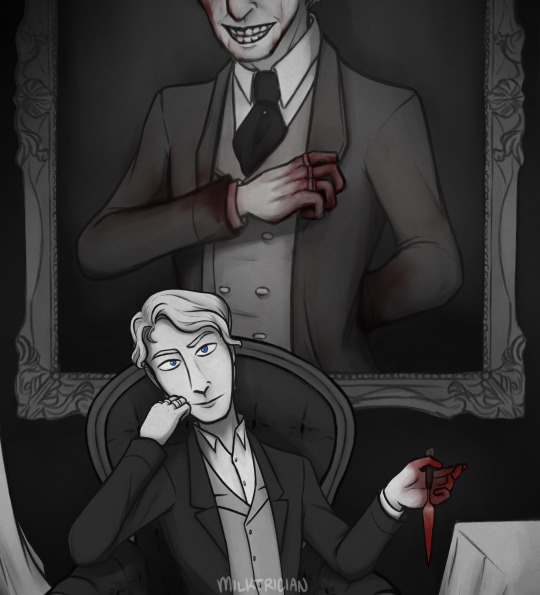
Finally finished this after reading the book a while back.
#the picture of dorian gray#dorian gray#tpodg#tpodg spoilers#classic lit#literature#classic literature#gothic literature#gothic lit#my art#digital#digital art#artists on tumblr#fan art#milktrician#Basil Hallward deserved better#tw blood
47 notes
·
View notes
Note
honestly??? I love exhibitionist gramon
I think it's cute that now that they're not in a secret relationship, they can post selfies and stuff together 🥺
Right?? It's so nice they don't have to hide anymore. The shit has hit the fan so badly I think Damon is like 🤷♂️ welp, might as well be extra because the media already knows what they know and has made me out to be *that guy* so I'm gonna choose being happy with my bf lol
2 notes
·
View notes
Note
Do you have any thoughts on Dorian's protestation that he's not responsible for the vices of his peers, vis à vis the ongoing question of how responsible Lord Henry is for Dorian's *all that* ?
I started writing a nice short answer to this, then it turns out that in fact I have many thoughts, all a bit disconnected from each other. Sorry about that.
So TPODG is all about layers upon layers of influence. Dorian's influence on his peers is one of those layers; so is Lord Henry's influence on Dorian; so is the influence of the "poisonous" yellow book on Dorian; and above all of that, there's Wilde's influence on his readers and artists' influence on their audience in general, which the preface primes us to start thinking about.
Dorian's influence on his peers
One thing I've just spotted is that Dorian disclaims his responsibility when it comes to corrupting men ("what is that to me?") but hedges when it comes to corrupting women ("You go too far"). Maybe that's because he is more responsible - I think the implication of chapter 12 is that Dorian had consensual affairs with Lady Gwendolen and Lord Gloucester's wife, but it's ambiguous.
There's a whole bundle of things that are probably too much to get into here: the fuzzy line for Victorians between being the victim of sexual assault vs being a willing and eager participant in an affair; Victorian feelings on female agency in general; and whether you could show a respectable noblewoman willingly committing adultery in a Victorian novel without being condemned for obscenity (see reactions to Jude the Obscure, for instance). I'm not sure which of these things were the greatest influence behind the choice of vices that Wilde implies.
Lord Henry's influence on Dorian
Basil is the moral voice of the novel, and Basil thinks Dorian's influence is his own fault. But equally, Basil has heard all the same things from Lord Henry as Dorian has, and even quotes Henry in Chapter 12 ("I remember Harry saying once that every man who turned himself into an amateur curate for the moment always began by saying that, and then proceeded to break his word") but Basil remains a good man. So the very existence of Basil is an argument against the idea that Dorian is responsible for his friends' vices, or that Lord Henry is responsible for Dorian's.
The yellow book's influence on Dorian
The book has a poisonous influence on Dorian... but Dorian "never sought to free himself from it". He is corrupted, but only because he lets himself be corrupted. He has agency that he declines to use. He could read something different! The novel concedes the point that what you read influences your choices, but not that this exonerates Dorian. (And interestingly, it's always the fault of the book, as if it were an independent actor, not the fault of the writer).
Wilde's influence on his readers
The collected reviews and letters about TPODG, including Wilde's defence, are a fun read (nb spoilers for the ending):
(Wilde's replies are, above all, spectacularly snobbish. I'm less surprised that they hated him after reading them.)
It includes the critics who managed to miss the point spectacularly:
The "moral," so far as we can collect it, is that man's chief end is to develop his nature to the fullest by "always searching for new sensations," that when the soul gets sick the way to cure it is to deny the senses nothing, for "nothing," says one of Mr. Wilde's characters, Lord Henry Wotton, "can cure the soul but the senses, just as nothing can cure the senses but the soul."
I mean. Guys. How much do you have to not get it to think that Lord Henry is a character we're supposed to agree with??
There's a three-way argument about the influence of the novel, where the options are:
It has no influence beyond what you bring to the table; it's art for art's own sake; there is no such thing as a moral or immoral book. Wilde makes that argument in his letters, though I always feel like there's an undercurrent of irony there.
It has a negative moral influence; it's corrupting and should have been censored. This is the view of the Scots Observer, among others: "Mr. Oscar Wilde has again been writing stuff that were better unwritten."
It has a positive moral influence; its moral is good. The Speaker thought so: "[Wilde] might fairly have insisted on the particular proposition—that the teaching of the book is conspicuously right in morality. If we have correctly interpreted the book's motive—and we are at a loss to conceive what other can be devised—this position is unassailable."
I think TPODG exists more to have this argument than to win it. No matter what your view, the different layers of influence in the novel give you something to argue with. I enjoy that a lot, and I suspect Wilde did too.
#dorian gray weekly#hope you enjoyed this ramble anon#i tried to bring it all together in a coherent point and i failed
20 notes
·
View notes
Text
my brothers got family rings from my father but since i'm trans i don't get a cool family heirloom thing so heres the knife with a Family History that i stole (is it even stealing if it's been sitting in a drawer for years??) i named it dorian bc my names basil and it has both enamored me and stabbed me
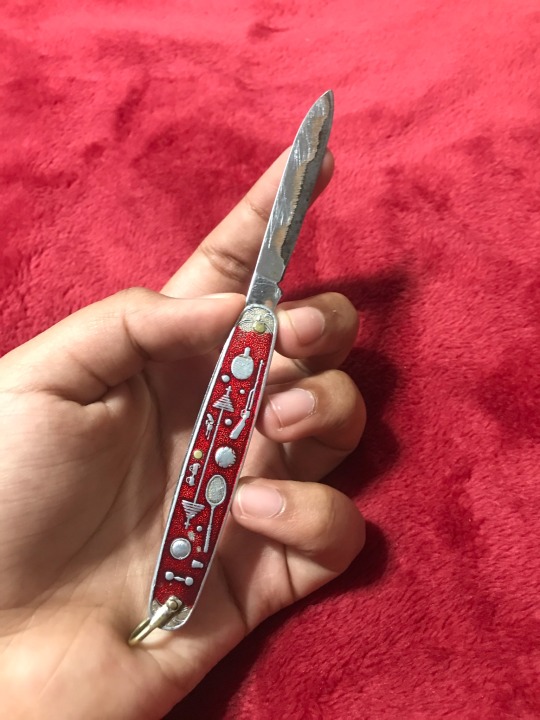
#fuck gender roles#im not even a girl anymore but it still sucks#ftm#the picture of dorian gray#tpodg spoilers#knife tw
34 notes
·
View notes